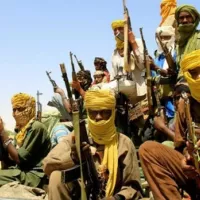Sudan, officially the Republic of the Sudan, is a country in Northeast Africa bordering seven other countries and the Red Sea. With a population of approximately 50 million as of 2024, it is Africa's third-largest country by area, covering 1,886,068 square kilometers. Khartoum serves as its capital and most populous city.
1905: Sultan Yambio Ends Struggle with British Forces
In 1905, Sultan Yambio ended his struggle with British forces occupying the Kordofan region.
1914: Sir Reginald Wingate Occupies Sudan
In December 1914, Sir Reginald Wingate was sent to occupy Sudan as the new Military Governor, following a formal end to Ottoman rule.
1924: British Policy of Separate Territories
From 1924, the British had a policy of running Sudan as two separate territories: the north and the south.
1925: Formation of the Sudan Defence Force
In 1925, the Sudan Defence Force was formed.
1927: Death of Saad Zaghloul
In 1927, Saad Zaghloul died, frustrated in his ambitions for a single Egyptian-Sudanese state.
1928: Peak in Sudanese Government Revenue
In 1928, the Sudanese Government's revenue reached a peak at £6.6 million.
July 1936: Signing of the Anglo-Egyptian Treaty
In July 1936, Muhammed Mahmoud brought Wafd delegates to London to sign the Anglo-Egyptian Treaty, allowing the British Army to return to Sudan.
1940: Italian Troops Occupy Kassala
In 1940, Italian troops occupied Kassala and other border areas from Italian Somaliland.
1942: SDF Participates in Invasion of Italian Colony
In 1942, the SDF participated in the invasion of the Italian colony by British and Commonwealth forces.
1952: Egyptian Revolution and Sudanese Independence
In 1952, the Egyptian revolution marked the beginning of the march towards Sudanese independence.
1952: Egyptian Revolution
In 1952, the Egyptian revolution toppled the monarchy and demanded the withdrawal of British forces from Egypt and Sudan.
1953: Egypt Abolishes Monarchy
In 1953, Egypt abolished the monarchy, with new leaders believing that abandoning claims of sovereignty was the only way to end British domination in Sudan.
January 1956: Sudan Declared an Independent State
On January 1, 1956, Sudan was declared an independent state.
January 1956: Sudanese Flag Raised
On January 1, 1956, the Egyptian and British flags were lowered, and the new Sudanese flag was raised by Prime Minister Ismail al-Azhari.
1956: British Policy of Separate Territories
The British Policy of running Sudan as two separate territories ended in 1956, when Sudan became independent.
May 1969: Coup d'état Led by Gaafar Nimeiry
On May 25, 1969, a coup d'état led by Col. Gaafar Nimeiry resulted in the abolishment of parliament and outlawing of all political parties.
July 1971: Briefly Successful Coup Led by Sudanese Communist Party
In July 1971, a briefly successful coup led by the Sudanese Communist Party occurred, followed by Nimeiry's restoration to power.
1972: Addis Ababa Agreement
In 1972, the Addis Ababa Agreement led to a cessation of the north-south civil war and a degree of self-rule.
1972: Government Plans to Export Food and Cash Crops
In 1972, the Sudanese government became more pro-Western and made plans to export food and cash crops.
1976: Ansars Mount Unsuccessful Coup Attempt
In 1976, the Ansars mounted a bloody but unsuccessful coup attempt.
July 1977: Nimeiry Meets with Ansar Leader
In July 1977, President Nimeiry met with Ansar leader Sadiq al-Mahdi, opening the way for a possible reconciliation.
1978: IMF Negotiates Structural Adjustment Program
In 1978, the IMF negotiated a Structural Adjustment Program with the Sudanese government.
1983: Application of Islamic Laws
From 1983, Islamic laws were applied in Sudan.
June 1989: Military Coup Led by Omar al-Bashir
On June 30, 1989, Colonel Omar al-Bashir led a bloodless military coup, suspending political parties and introducing an Islamic legal code.
1989: Military Dictatorship Led by Omar al-Bashir
In 1989, a 30-year-long military dictatorship led by Omar al-Bashir began in Sudan.
October 1993: al-Bashir Appoints Himself President
On October 16, 1993, al-Bashir appointed himself "President" and disbanded the Revolutionary Command Council.
1996: General Election
In the 1996 general election, al-Bashir was the only candidate by law to run for election and Sudan became a one-party state.
2000: Dissolution and State of Emergency
Before the 2000 presidential election, al-Turabi introduced a bill to reduce the President's powers, prompting al-Bashir to order a dissolution and declare a state of emergency. Hassan al-Turabi was jailed later that year.
February 2003: Arms Taken Up in Darfur
In February 2003, the Sudan Liberation Movement/Army (SLM/A) and Justice and Equality Movement (JEM) groups in Darfur took up arms.
2003: Ethnic Genocide in Darfur
From 2003, ethnic genocide occurred in Darfur.
2011: Independence of South Sudan
In 2011, the long-standing civil war between the Islamic North and the Animists and Christians in the South led to the independence of South Sudan.
2018: Protests Erupt Demanding Bashir's Resignation
In 2018, protests erupted in Sudan demanding Bashir's resignation.
April 2019: Coup d'état and Imprisonment of al-Bashir
In April 2019, protests demanding Bashir's resignation resulted in a coup d'état, leading to Bashir's imprisonment.
2020: Sudan Becomes a Secular State
In 2020, Sudan transitioned from a state religion to a secular state.
2020: Ethnic Genocide in Darfur
The ethnic genocide that started in Darfur in 2003 ended in 2020.
2024: Sudan's Ranking on Human Development Index and GDP
As of 2024, Sudan ranks 170th on the Human Development Index and 185th by nominal GDP per capita.
2024: Sudan Population and Development Index
In 2024, Sudan has a population of 50 million people and ranks 170th on the Human Development Index.
Mentioned in this timeline

Donald John Trump is an American politician media personality and...

Barack Obama the th U S President - was the...
Nigeria is a West African nation the most populous in...

The Sudanese conflict in South Kordofan and Blue Nile fought...
Saudi Arabia officially the Kingdom of Saudi Arabia KSA is...
China officially the People's Republic of China is an East...
Trending
18 minutes ago Cavs' Health Improves: Wade's Return Boosts Playoff Hopes; Mobley's Status Questionable
19 minutes ago Estonia Buys Bunkers: Fortifying Border Amidst Russia Tensions, Bolstering Baltic Defenses

19 minutes ago Zion Williamson to play against Bucks, securing $16.8 million guarantee.

19 minutes ago Rudy Gobert Suspended for Flagrant Foul in Game Against 76ers

20 minutes ago Tirante vs. Tabilo: Rio Open 2026 Prediction and Highlights of Garin Match

20 minutes ago Fritz and Paul Advance to Delray Beach Quarterfinals: Predictions and Schedule
Popular

Jesse Jackson is an American civil rights activist politician and...
Randall Adam Fine is an American politician a Republican who...

Barack Obama the th U S President - was the...

Ken Paxton is an American politician and lawyer serving as...

Bernie Sanders is a prominent American politician currently serving as...

Pam Bondi is an American attorney lobbyist and politician currently...